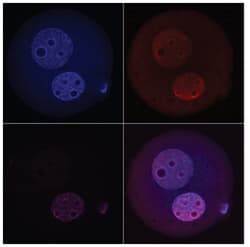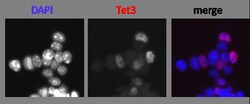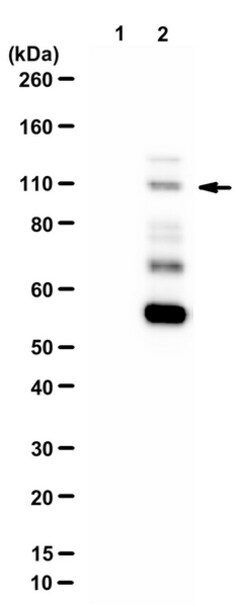Promotional price valid on web orders only. Your contract pricing may differ. Interested in signing up for a dedicated account number?
Learn More
Learn More
MilliporeSigma™ TET3, Rabbit, Unlabeled, Polyclonal,
Rabbit Polyclonal Antibody
Supplier: MilliporeSigma™ ABE290
Description
MABE1144/1132/1133 Methylcytosine dioxygenase TET3 (EC 1.14.11.n2; UniProt O43151) is encoded by the TET3 (also known as KIAA0401) gene (Gene ID 200424) in human. TET (ten-eleven translocation) proteins (TET1, TET2, and TET3) oxidize 5-methylcytosine (5mC) to 5-hydroxymethylcytosine (5hmC), 5-formylcytosine (5fC), and 5-carboxylcytosine (5caC), providing a means for active epigenetic DNA demethylation in mammals. TET proteins also modify genomic thymine residues to 5-hydroxyuracil. TET proteins depend on Fe(II) and 2-oxoglutarate as cofactors for activity, and 2-oxoglutarate is known to inhibit their activity, while ascorbate is shown to stimulate TET-mediated cytosine oxidation. In addition, post-translational modifications (PTMs), such as phosphorylation and O-GlcNAcylation, also play a role in regulating the activity of TET proteins. TET1 and TET2 are found highly expressed in mouse embryonic stem cells (mESCs) and TET3 is known to be upregulated in oocytes and oxidize the silenced paternal pronuclear DNA. High levels of TET proteins and genomic 5-hydroxymethylcytosine in neuronal tissues are also reported. Three TET3 spliced isoforms/variants have been reported, the long or full-length isoform Tet3FL and the short isoform Tet3s are upregulated during embryonic stem cell (ESC) differentiation toward the neuronal lineage, while Tet3o is oocyte-specific and not detected in ESCs or in any other cell types or adult mouse tissues tested, indicating a role of Tet3o in paternal genome oxidation in mouse zygotes. Tet3FL and Tet3o contain the entire Tet3s sequence with additional (but different) N-terminal sequence. Only Tet3FL contains an N-terminal CXXC domain that binds to unmethylated CpGs and exhibits highest affinity toward 5caC. Tet3FL is substantially less active than Tet3o and Tet3s, suggesting that the CXXC domain restricts Tet3FL 5mC oxidation capacity.
Specifications
| TET3 | |
| Polyclonal | |
| Unconjugated | |
| TET3, KIAA0401 | |
| Rabbit | |
| Affinity Purified | |
| RUO | |
| Primary | |
| Immunogen sequence is present in TET3 isoforms Tet3FL, Tet3s, and Tet3o spliced isoforms reported by Jin, S.G., et al. (2016). Cell Rep. 14(3):493-505), as well as all additional human and mouse TET3 spliced isoforms reported by UniProt (O43151, Q8BG87). Note that UniProt isoform 1 (O43151-1/human and Q8BG87-1/mouse) corresponds to isoform Tet3s, not Tet3FL (NM_001287491.1/human and JX946278.1/mouse). | |
| Stable for 1 year at 2°-8°C from date of receipt. Note: It is recommended to store the product undiluted at 2°-8°C and protected from prolonged exposure to light. Do not freeze. |
| ChIP Assay, Immunocytochemistry, Immunoprecipitation, Western Blot | |
| Please refer to lot specific datasheet. | |
| Purified rabbit polyclonal antibody in buffer containing 0.1M Tris-Glycine (pH 7.4), 150mM NaCl with 0.05% Sodium Azide. | |
| O43151 | |
| KLH-conjugated linear peptide corrsponding to an internal sequence within the N-terminal half of human TET3. | |
| 100 μg | |
| Epigenetics & Nuclear Function | |
| NP_001274420 | |
| Mouse |
Product Content Correction
Your input is important to us. Please complete this form to provide feedback related to the content on this product.
Product Title
For Research Use Only. Not for use in diagnostic procedures.
Spot an opportunity for improvement?Share a Content Correction



